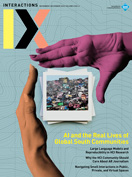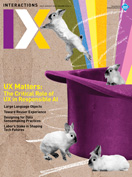Authors:
Priya Kumar
My research explores how privacy operates in the digital age, but I'm finding much privacy literature, with its focus on individual control and data protection, stifling. These books animate my thinking and spark new directions for research.

Meeting the Universe Halfway: Quantum Physics and the Entanglement of Matter and Meaning
By Karen Barad (2007)
I've long enjoyed physics books (Adam Frank's About Time is a favorite), but I never expected to draw on physics in my research. Karen Barad, a particle physicist turned feminist technoscience philosopher, offers a theory of existence that inverts conventional understandings of agency. We typically assume the world is made of discrete entities that, through interactions, produce relations (i.e., protons and neutrons bound by the strong force or parents and children linked through kinship bonds). But Barad argues that, from the quantum level on up, entanglement, not separation, is the default. Through "intra-action," boundaries temporarily delineate phenomena. Agency is not a property of individuals, but rather the ongoing process of intra-action among the human and non-human. Heady stuff, if you can wrap your head around it.

Configuring the Networked Self: Law, Code, and the Play of Everyday Practice
By Julie Cohen (2012)
Privacy research can be frustrating because privacy means many things. Is it a human right? A commodity? A state of being? A form of control? These conceptions situate privacy within a liberal understanding of the self as aspiring to freedom and self-determination. This ignores the emplaced and embodied aspects of identity, forgetting that our sense of self is embedded in webs of culture, social institutions, and relationships. Legal scholar Julie Cohen approaches privacy from the perspective of the socially constructed self. She argues that privacy exists not to protect individuals from the world but rather to give them shelter for exploring different ways of being. Privacy is the breathing room to dynamically manage the boundaries surrounding one's subjectivities. In an age defined by the incessant normalization of smart technologies, Cohen offers a refreshing outlook on why privacy matters.
Barad argues that, from the quantum level on up, entanglement, not separation, is the default.

Dark Matters: On the Surveillance of Blackness
By Simone Browne (2015)
The concept of surveillance capitalism is in vogue when discussing the ills of a digitally saturated world. Too often, these conversations regard the phenomenon as a recent invention of global Internet companies and overlook the fact that certain people have long borne its harms. In this trim volume, Black studies scholar Simone Browne unpacks what happens when "blackness enters the frame" of surveillance. Traversing the Middle Passage, when Africans were crammed asphyxiatingly close onto ships for enslavement, the burning of flesh to brand slaves, the racialization of facial recognition and other biometric technologies, and contemporary airport security procedures that disproportionally target Black women, Browne illustrates that surveillance in the service of capitalist (and nationalist) imperatives is anything but new. Browne's incisive prose forces readers to confront the cruel and dehumanizing ways in which people have, for centuries, used information technologies to track, regulate, and enforce the movement of Black people, while also honoring the ways they have resisted.
Priya Kumar is a Ph.D. candidate at the University of Maryland's College of Information Studies. Her research focuses on families, technology use, and privacy. Her dissertation examines the practice of parents posting pictures of children on social media as a case study of how privacy operates in the digital age. [email protected]
Copyright held by author
The Digital Library is published by the Association for Computing Machinery. Copyright © 2020 ACM, Inc.







Post Comment
No Comments Found